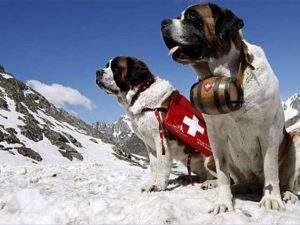Well, it seems that a new craze has taken hold in Canada – the muddled concept of the “rescue dog”.
This phrase first floated into my world some months back, when my sister wrote a startling message describing her encounter with elderly friends’ new family member, the Great Dane Rescue Dog.
From what I recall, the howling dog tore through the restraining door, and its rolling eyes accidentally met hers. After some skirmishes, she found herself pinned to the floor with the dog slashing its teeth, making a nasty throat-noise, and drooling above her.
I replied that the animal seemed quite spontaneous and undisciplined for a rescue dog. I know my dogs. We have had St Bernards in the family for decades, and though we’ve never been able to teach them anything, the concept of their plodding stalwartly through the snowdrifts in the Alps looking for people always made perfect sense to me.
And when not snoring and eating, they did always look out for children and guests in many gentle and thoughtful ways. Locking their teeth on a sweater sleeve when not wanting a person to leave the room, or a playful paw in the face to wake you up from an afternoon snooze on the couch come immediately to mind.
 But no. These Canadian canines are not REAL rescue dogs. In the new politically correct language of double-think, the human is the rescuer and the dog is the rescuee.
But no. These Canadian canines are not REAL rescue dogs. In the new politically correct language of double-think, the human is the rescuer and the dog is the rescuee.
These are the dogs you get from the pound. They are often young, energetic, and very big. Their reasons for being in the animal shelters are many, I am sure. They are advertised as being “pre-loved”. Many might have been “pre-hated”.
It is a moral status symbol to own such a dog. The onus is on the human to keep these dogs alive no matter what. As they age and their hips fail, you carry them up and down steps. As their kidneys fail, you inject them with liquids. As their hearing and sight fail, you walk them carefully on long strings and soft paths so they don’t get lost. You attach a bell to their collar.
It becomes a moral human failure to have a dog put down because of age and/or illness.
You have no responsibility for having dealt with dubious breeders and/or puppy mills.
You are pure, and as you are walking through a virgin forest and you spot a dastardly villain lowering a large-eyed puppy down into a bottomless well in a bucket. You shout out and save it. You name the dog Bucket to remind yourself of a momentary shining white knight part of your personality. You take lessons in “behoming”.
From then on, you are a happy martyr to your lucky lucky dog. And you tell everyone that you are the saviour of Bucket, the Rescue Dog.